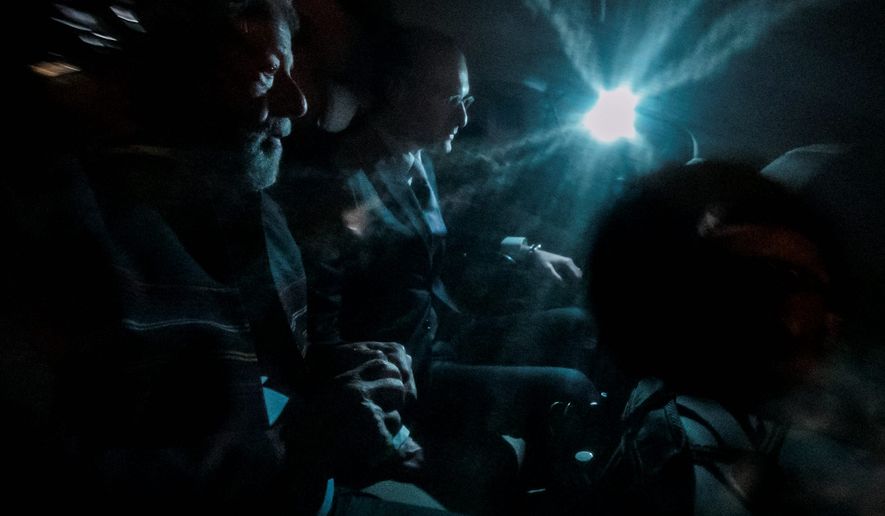BUENOS AIRES — In a breakneck one-two punch, Brazil’s highest court and a top anti-corruption judge ordered former Brazilian President Luiz Inacio Lula da Silva to prison to face corruption charges — effectively quashing the comeback hopes of the most influential Latin American leftist politician of his generation.
Hours after the Supreme Federal Tribunal refused to shield Mr. da Silva from arrest in a dramatic 6-5 decision, Judge Sergio Moro on Thursday gave the charismatic onetime factory worker and founder of Brazil’s Workers’ Party (PT) — known universally as just “Lula” — until 5 p.m. Friday to turn himself in and begin serving a 12-year sentence.
Even before Judge Moro’s order, Mr. da Silva had privately acknowledged that his impending incarceration would kill any hopes that he could contend for a third term in the October presidential election, despite his continuing pull with his leftist base.
“They weren’t going to commit the coup then let me be a candidate,” Mr. da Silva — the undisputed front-runner in polls — told party elders in a nod to the 2016 ouster of his handpicked successor, Dilma Rousseff, who was ultimately impeached, the O Estado de S. Paulo newspaper reported.
With much of Brazil’s political class reeling from the fallout from a massive bribery scandal tied to the giant engineering and construction company Odebrecht, Judge Moro found Mr. da Silva guilty of trading favors with a construction company in exchange for the promise of a beachfront apartment. That conviction was upheld by an appeals court in January.
Still, as PT leaders huddled in Sao Paulo on Thursday morning, talk of a da Silva replacement remained a taboo, and the party’s hard-left wing called for rebellion and a “human cordon” to prevent the 72-year-old’s arrest.
Loyalty toward the man whom supporters credit with adding 40 million Brazilians to the middle class during his 2003-2010 presidency is unlikely to waver, said Wagner Mancuso, a University of Sao Paulo political scientist.
“As long as there is hope, as minimal as it may be, they’ll continue to back Lula, even if jailed,” Mr. Mancuso told The Washington Times.
PT chief Gleisi Hoffmann on Thursday echoed that prediction and warned that putting Mr. da Silva behind bars would make Brazil a “banana republic.” She insisted that Mr. da Silva would remain the party’s standard-bearer.
Leadership vacuum
But the more likely outcome is an October ballot without Mr. da Silva, leaving voters with virtually no top-tier contenders in the race to succeed the embattled center-right President Michel Temer, who was catapulted into the job by Ms. Rousseff’s ouster.
After a half-decade of corruption scandals and economic turmoil, the leadership vacuum now threatens to bring the country’s political system to the brink, as a Tuesday tweet by army commander Gen. Eduardo Villas Boas suggested.
Hours before the ruling in Mr. da Silva’s case, the four-star general hailed the armed forces’ “repudiation of impunity” and said they were “attentive to their institutional mission.”
Critics viewed the comments as a hint at military intervention.
“This was not a retired general or a nobody; he’s the head of the Brazilian army,” Mr. Mancuso said. “I really don’t think he was kidding.”
But for better or worse, Mr. da Silva’s exit from the electoral scene may defuse the threat of an institutional breakdown, he said.
To PT backers, though, Gen. Villas Boas’ remarks were just the latest instance of what they view as an illegitimate persecution of both Mr. da Silva and Ms. Rousseff — their long-standing anger toward Judge Moro now also directed at the Supreme Federal Tribunal.
The high court’s Wednesday decision was a nationally televised, 10-hour marathon in which Chief Justice Carmen Lucia, a da Silva appointee, cast the deciding vote around midnight.
The event lit up social media, with an average of 463 Twitter mentions per minute, Brazilian media reported. Then, after less than 20 hours of suspense, Mr. Moro’s arrest warrant seemed to seal da Silva’s fate.
To protect Mr. da Silva’s “dignity” as a former head of state, Judge Moro said, he would be housed “separately from other inmates, without any risk to his moral or physical integrity.”
As of Thursday evening, Brazil’s Federal Police were engaged in private talks with Mr. da Silva’s representatives to negotiate the details of his arrest, according to the Folha de S. Paulo newspaper.
Critics, though, initially zoomed in on the chief justice’s refusal to postpone the ruling while a broader interpretive decision is pending. At issue in both cases is how to apply a constitutional provision that guarantees defendants the right to exhaust all their appeals before being considered guilty.
Until a final analysis is reached, Wednesday’s ruling represented a nondecision, Justice Gilmar Mendes, who voted with the minority, said Thursday from Lisbon, Portugal.
But even if he somehow finds a way to somehow reverse Mr. Moro’s order, Mr. da Silva’s conviction on appeal already makes him ineligible to run for office, said Mr. Mendes, who heads Brazil’s top electoral court.
“What the PT tried to do — and I’m not saying it’s illegitimate — was to extend Lula’s candidacy because Lula attracts votes,” he said, “and he might later have the ability to hand them over.”
As for the field of remaining candidates, the most prominent names include one of Ms. Lucia’s longtime colleagues, former high court justice turned political maverick Joaquim Barbosa, and former Sao Paulo Mayor Fernando Haddad, viewed as the most viable option after Mr. da Silva within the PT.
But as Brazil, where voting is compulsory, tumbles even further into political no-man’s land, it’s likely many citizens will have had enough and drive blank and void ballots to an unprecedented level, Mr. Mancuso warned.
“It’s already high, and it’ll be higher still,” he said. “Part of the electorate is reacting with revolt; [another] will react with dejection.”




Please read our comment policy before commenting.